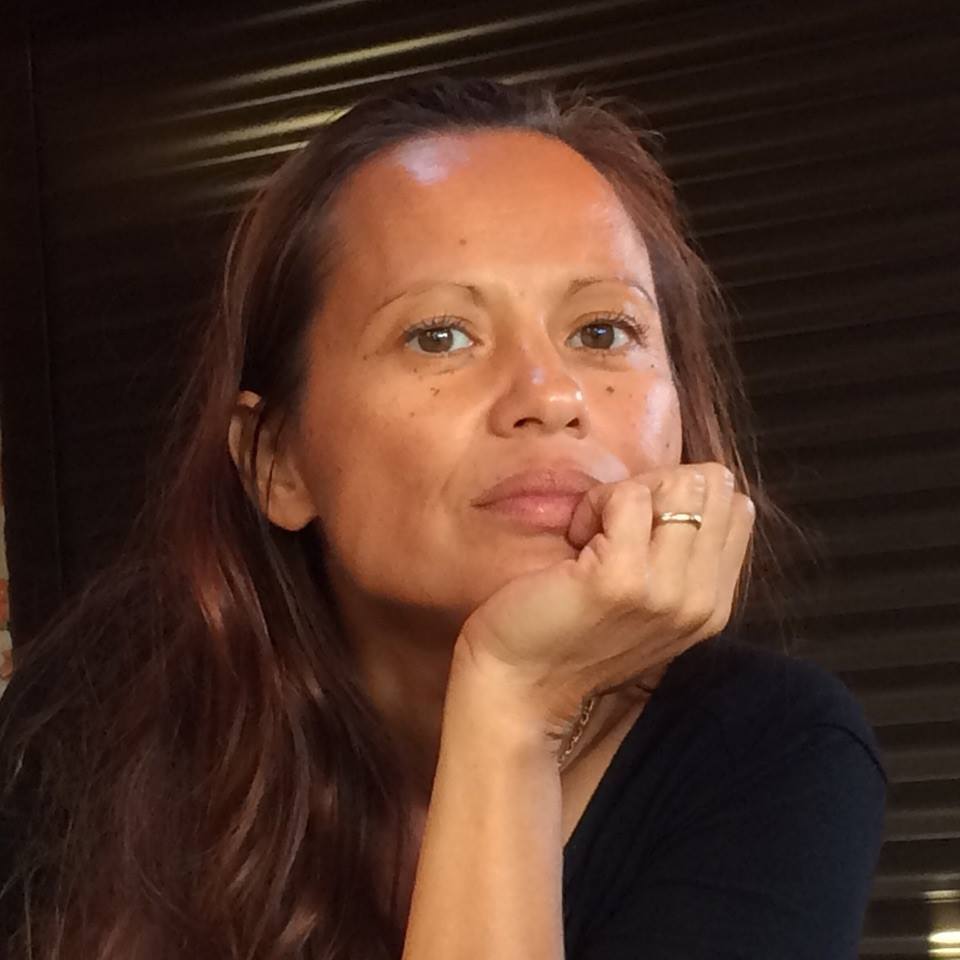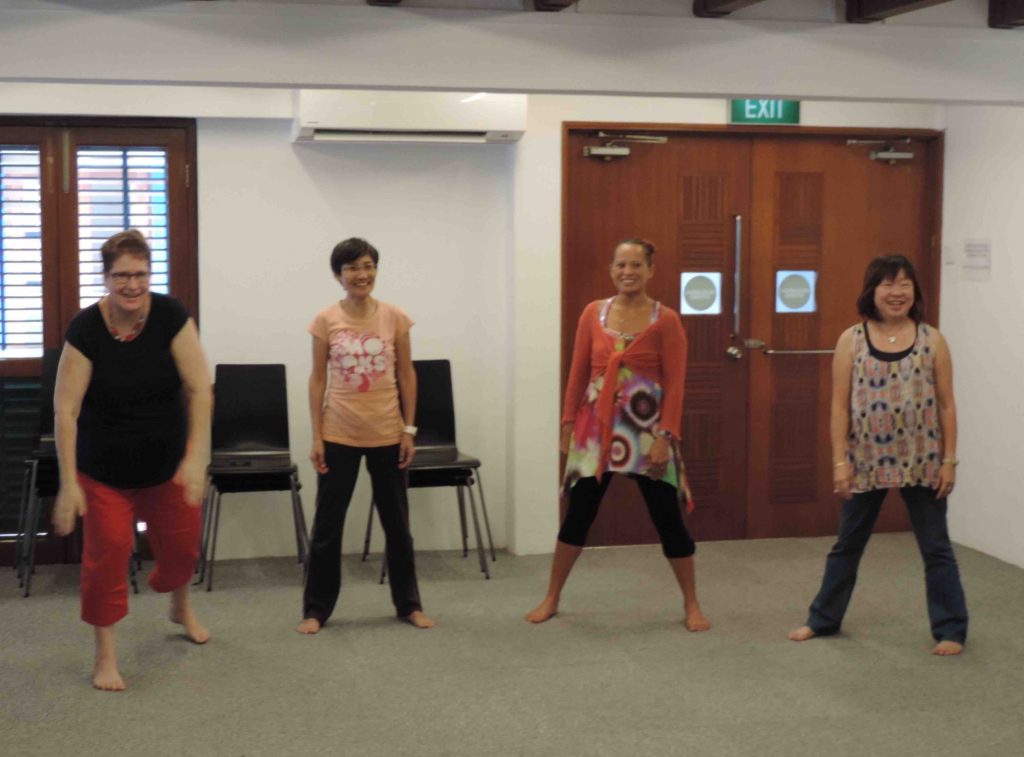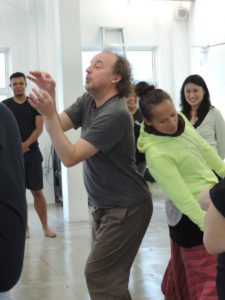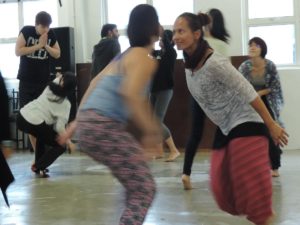SDEA Spotlight: Thi Liên Margaillan
by SDEA

SDEA Spotlight is a series of short interviews with SDEA members that peel back the curtain behind their practice, their beliefs about arts and drama education and their influences. Thi Liên Margaillan has been a member of SDEA since 2012. Because of her international background, her practice as a drama educator is shaped by a great desire to reach out to different communities. Using drama as a pedagogical tool, she is interested in researching communication forms that support the learning of verbal languages. She works with international children and also takes part in local charity projects.

- What are you working on at the moment?
I facilitate regular weekly drama workshops, mainly in French to students from 6 to 14 years old.
We just finished our annual “Skit! Charity” project which consisted of various skits performed by my groups to a local public audience of young children from the Touch Young Arrows. Most importantly, the session was all about the interaction between the children from my drama group and Touch Young Arrows.
Coming from different backgrounds with different languages, they all got to know a bit more about each other and mainly had some fun together via drama games. In the spirit of Christmas, it has always been my wish to do something even more meaningful for my students, for other children and for myself. It is not always about taking, but about giving and sharing.
I'm hoping that this event will be become a good memory for them to keep. It was both satisfying and moving to have realized this project, the best part being to see the smiles on the faces of all the children involved.
During the June school holidays I am planning to propose more drama activities for local Singaporean children. I have also set up a drama workshop from January for Non-French native speakers to practice the French language. That’s also a project close to my heart as I am convinced of the benefits that Drama tools can bring to support the learning of a language. There is no better way to learn than experimenting and putting in practice what you've learnt academically to memorize even better and with lots of fun. “If you can’t go to France, France is coming to you!”?
**

- What’s the direction of your work? Has it changed over the years?**
The heart and the development of a child will always be my main direction but I would like to go further with different categories of youth and of various communities.
I can’t see as a drama educator how your work couldn’t change. Drama and its process evolve constantly so this is no wonder that our directions and methods will always change too even though we keep the basic lines, we just extend our field.
3. What is a dream project that you hope to do?
I mentioned already couple of them at short term. But think I need an extra life to realise all of them!! ?
The main one in long term would be to travel around the world, mainly in countries facing difficulties, proposing some drama workshops within orphanages, different communities, learning about their culture and hopefully bringing something in exchange too.
I would also love to create a group, where people can come to express themselves via their body. Moving rather than dancing at first, then exploring the different style and different music. I just see too many people going through classes with a pain in their eyes and they don’t seem to enjoy it. Movement should be about freedom of expression and love for your body, before even the thought of getting fit.
Learning more about working with mentally & physically disabled children. My experience had been really relevant but too short and I realized I need to get deeper knowledge about different disabilities and the process of working with students who have them.
4. How did you start out doing what you do?
Before I discovered the world of Drama, my passion was dancing. I helped create choreography in International schools. Just to see the shiny eyes and smiles illuminating children’ faces because of their achievement was a revelation to me and it fast became a meaningful career to pursue.
5. How do you keep your work fresh?
Permanent review of what we are doing. Observing, listening and sharing different perceptions. So basically the fact there is no totally right and wrong answer, we need to keep our minds open and learn from others. I read quite a bit and keep my doors open to any local or international workshops or events while I can.
6. What do you think makes a perfect drama educator?
As previously said, observing, listening and sharing are qualities in my opinion that can’t be neglected by a drama educator. As well as being open minded, we need to continue to be creative and encourage creativity amongst our students. Thus, this will boost their confidence to explore in more depth their problem solving skills.
**

- Why Drama is so important? Why should it be taught in schools?**
We all learn in different ways. Some people will learn more efficiently by using visual tools, others will be more at ease by hearing or acting out what they’ve learnt.
So this is where Drama can be useful as a tool of learning but also as a tool of life and social skills, without saying the obvious skill to be able to express your ideas in front of a public.
8. Who was the drama educator that has the most impact on you?
I think everyone I met and am still meeting, has played a part in shaping who I am today, so not only one person specifically. For Sophie Bendel, who gave me the opportunity to be onstage, Michael Cheng and his dedication with disabled children, John Britton for his pure logical process of delivering drama, I could continue so forth. But I know more who I regret not to have met yet. ☺
9. What is your most memorable moment in the classroom /on stage?
In the classroom: There are too many good moments when children have been full of creativity, joy and empathy but I always feel blessed when the shyest ones take a step forward to express themselves.
On stage: During my last performance, I had to start the play on my own with great musicians who accompanied me magically and finish the play with one powerful line. Memorable souvenirs with the whole cast and team without forgetting our improvisation onstage!
10. Share a drama activity that you like to do
A) The translator:
- 3 participants.
- One being the translator between the 2 others who have to create their own gibberish languages.
- The translator has to use his imagination and creativity to find some kind of translation in a common language while respecting the tones and the speech length of its interlocutors.
B) Another extra pair of hands:
- In pairs, one has to stand behind the other and put his arms at the service of the one in front.
- The one standing in front can’t use his owns arms. He talking to himself to give instructions to his partner such as “I need to brush my hair”, “I want to read this article”, “I am feeling a feeling a bit peckish today”, etc
I've had a lot of success with children using these 2 activities which always made them laugh.



